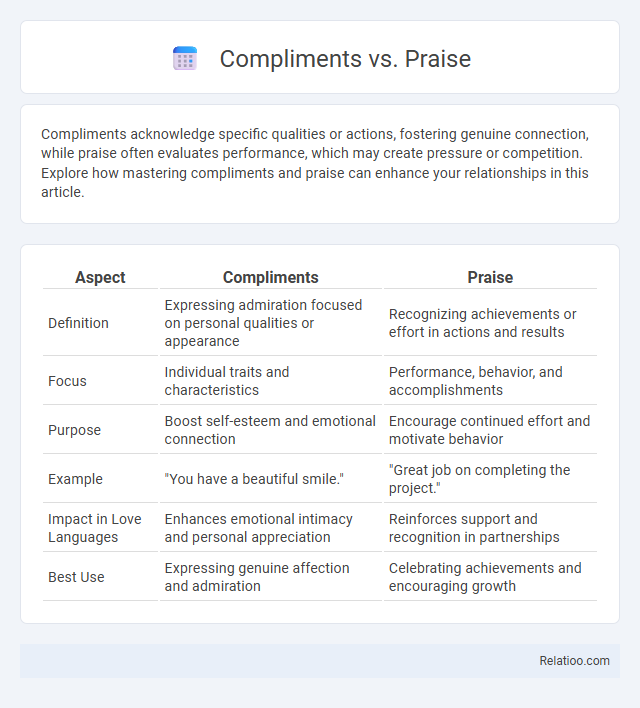Compliments acknowledge specific qualities or actions, fostering genuine connection, while praise often evaluates performance, which may create pressure or competition. Explore how mastering compliments and praise can enhance your relationships in this article.
Table of Comparison
| Aspect | Compliments | Praise |
|---|---|---|
| Definition | Expressing admiration focused on personal qualities or appearance | Recognizing achievements or effort in actions and results |
| Focus | Individual traits and characteristics | Performance, behavior, and accomplishments |
| Purpose | Boost self-esteem and emotional connection | Encourage continued effort and motivate behavior |
| Example | "You have a beautiful smile." | "Great job on completing the project." |
| Impact in Love Languages | Enhances emotional intimacy and personal appreciation | Reinforces support and recognition in partnerships |
| Best Use | Expressing genuine affection and admiration | Celebrating achievements and encouraging growth |
Understanding Compliments and Praise
Compliments and praise both involve expressing approval, but compliments typically recognize specific qualities or actions, while praise often conveys broader appreciation for overall performance or character. Understanding compliments involves identifying sincere, situation-specific remarks that reinforce positive behaviors, whereas praise encompasses more general acknowledgment, often used to motivate and encourage. Clarifying the difference helps in effectively communicating appreciation and fostering positive relationships.
Key Differences Between Compliments and Praise
Compliments are brief, specific remarks recognizing someone's qualities or achievements, often spoken spontaneously, while praise is more formal and detailed, expressing admiration and approval for effort or success. Your understanding should highlight that compliments are generally casual and personal, making the receiver feel appreciated immediately, whereas praise is typically used in structured environments like work or education to motivate and reinforce positive behavior. Recognizing these key differences helps you choose the most effective way to encourage and acknowledge others.
The Psychology Behind Compliments and Praise
Compliments and praise engage your brain's reward system differently, with compliments often targeting personal qualities and boosting self-esteem, while praise typically focuses on specific achievements, reinforcing motivation and behavior. Understanding the psychology behind these expressions reveals that well-timed compliments foster genuine connection and positive self-image, whereas praise drives performance by highlighting effort and success. Both play unique roles in shaping your social interactions and emotional well-being through distinct cognitive and emotional pathways.
Impact on Self-Esteem and Motivation
Compliments, praise, and the act of complimenting each influence self-esteem and motivation differently; compliments focus on specific traits or actions, fostering genuine self-worth, while praise often centers on performance, which can enhance motivation but sometimes create dependency on external validation. You benefit most when compliments highlight your unique qualities, promoting intrinsic motivation and long-term confidence. Consistently receiving sincere compliments leads to a stronger, more resilient self-esteem compared to praise that may feel conditional or achievement-based.
Cultural Perspectives on Compliments vs Praise
Cultural perspectives on compliments versus praise influence how individuals perceive and respond to positive feedback, with some cultures valuing modesty and indirect praise to maintain social harmony. In collectivist societies, compliments often serve as subtle social bonds, while direct praise may be reserved for formal achievements, shaping how Your expressions of recognition are received. Understanding these nuances ensures effective communication and fosters positive interpersonal relationships across diverse cultural contexts.
When to Use Compliments or Praise
Compliments highlight specific qualities or achievements, making them ideal for acknowledging someone's effort or appearance in casual or social settings. Praise tends to be broader and more formal, often used in professional or educational contexts to reinforce positive behavior or performance. Use compliments to create immediate positive connections, while praise helps motivate and encourage sustained excellence in Your team or peers.
Common Misconceptions and Mistakes
Compliments often refer to brief expressions of admiration, while praise tends to be more detailed and related to specific achievements or qualities. A common misconception is using compliments and praise interchangeably, which can dilute the impact of genuine recognition. Mistakes include giving insincere compliments or generic praise that fails to acknowledge individual effort, reducing motivation and trust.
Compliments and Praise in the Workplace
Compliments in the workplace recognize specific behaviors or achievements, fostering motivation and positive reinforcement, while praise often carries a broader, more general acknowledgment of overall performance or attitude, boosting morale and engagement. Your ability to differentiate between compliments and praise ensures that feedback is both meaningful and impactful, encouraging continuous improvement. Strategic use of compliments can enhance individual confidence, whereas well-timed praise nurtures a supportive team culture.
Building Effective Communication with Compliments and Praise
Compliments and praise both play vital roles in building effective communication by reinforcing positive behavior and fostering trust. Compliments often focus on specific attributes or actions, making your feedback personalized and genuine, while praise generally acknowledges overall achievements, boosting motivation and confidence. Your ability to balance sincere compliments with appropriate praise strengthens relationships and enhances mutual respect in personal and professional interactions.
Tips for Giving Genuine Compliments and Praise
Giving genuine compliments involves observing specific behaviors or qualities and expressing sincere appreciation that feels personal and meaningful. Praise should be timely, focused on effort or improvement rather than just outcomes, and delivered in a way that reinforces positive actions to motivate continued progress. Using clear, honest language that avoids exaggeration ensures compliments and praise build trust and foster genuine connections.

Infographic: Compliments vs Praise
 relatioo.com
relatioo.com